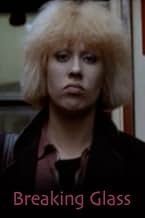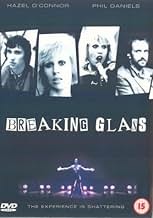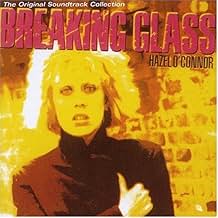Breaking Glass
- 1980
- Tous publics
- 1h 44min
NOTE IMDb
6,8/10
1,7 k
MA NOTE
Ajouter une intrigue dans votre langueA rock singer is determined to rise to the top of the profession, letting nothing stand in the way of that goal.A rock singer is determined to rise to the top of the profession, letting nothing stand in the way of that goal.A rock singer is determined to rise to the top of the profession, letting nothing stand in the way of that goal.
- Réalisation
- Scénario
- Casting principal
- Nomination aux 1 BAFTA Award
- 2 nominations au total
Lowri Ann Richards
- Jane
- (as Lowri-Ann Richards)
Avis à la une
Breaking Glass is an excellent movie which has suffered from neglect and wholly inaccurate political associations. This movie was written and made in 1978 and 1979 and released in 1980. Therefore it couldn't possibly be: "A truly excellent portrayal of 80s Britain".Nor does it depict life in: "Thatcher's Britain".
In fact Breaking Glass depicts Callaghan's Britain, which was characterised by a deplorable catalogue of industrial disputes, strikes, high unemployment, and collapsing public services during the winter of 1978-9, dubbed the 'Winter of Discontent'.
What this movie is, is one of the best kept secrets in British cinema history. And although Hazel O'Connor enjoys second billing to Phil Daniels who had just done Quadrophenia to great acclaim, she is one of the greatest talents we've ever produced. Indeed, Hazel shines as the real star throughout, possibly drawing on her own personal experiences growing up in Coventry following the break-up of her parent's marriage, which lead to her running away to Europe at the age of 16.
I saw this film in the cinema the week it was released in the UK and I was stunned by both Hazel's singing and acting talent as well as that of the saxophonist superbly played (and dubbed) by Jonathan Pryce. That solo is a classic all on its own. Every feeling I felt at the time whilst watching this stark portrayal of human nature and the workings of the music industry has stayed with me until today.
In many ways Breaking Glass suffers from being too current. All stories of social history work best when set in the past. Quadrophenia worked because it spoke of a previous period of disruptive British history - 20 years in the past. Also, there was already an undercurrent of opposition to Thatcher, but the country the Conservatives inherited from Labour on 4th May 1979 was a wreck. So it was perhaps convenient for some to use it as a metaphor for the greed and excess that was in fact still yet to come.
See this movie and enjoy it for what it is: a landmark in British Cinema history and a brilliant one-off performance from everyone involved. And catch Hazel on the net, where she sells much of her music, and live on stage where she's still gigging.
In fact Breaking Glass depicts Callaghan's Britain, which was characterised by a deplorable catalogue of industrial disputes, strikes, high unemployment, and collapsing public services during the winter of 1978-9, dubbed the 'Winter of Discontent'.
What this movie is, is one of the best kept secrets in British cinema history. And although Hazel O'Connor enjoys second billing to Phil Daniels who had just done Quadrophenia to great acclaim, she is one of the greatest talents we've ever produced. Indeed, Hazel shines as the real star throughout, possibly drawing on her own personal experiences growing up in Coventry following the break-up of her parent's marriage, which lead to her running away to Europe at the age of 16.
I saw this film in the cinema the week it was released in the UK and I was stunned by both Hazel's singing and acting talent as well as that of the saxophonist superbly played (and dubbed) by Jonathan Pryce. That solo is a classic all on its own. Every feeling I felt at the time whilst watching this stark portrayal of human nature and the workings of the music industry has stayed with me until today.
In many ways Breaking Glass suffers from being too current. All stories of social history work best when set in the past. Quadrophenia worked because it spoke of a previous period of disruptive British history - 20 years in the past. Also, there was already an undercurrent of opposition to Thatcher, but the country the Conservatives inherited from Labour on 4th May 1979 was a wreck. So it was perhaps convenient for some to use it as a metaphor for the greed and excess that was in fact still yet to come.
See this movie and enjoy it for what it is: a landmark in British Cinema history and a brilliant one-off performance from everyone involved. And catch Hazel on the net, where she sells much of her music, and live on stage where she's still gigging.
I haven't seen this movie in a few years catching it once on late night TV here in the states but I actually saw it multiple times in theaters here and later on HBO its awesome. Hazel O'Connor is amazing her voice, her acting are spot on, the lyrics to every song have great meaning from the radical anti racist Blackman, to the Anti Machine 8th day which looking back was way ahead of its time, to the incredibly touching torch song Will You. Every aspect of this production was a statement on the 80's, the Corporate Music Industry, and most of all our materialism and racism it was so much more than it appears on the service it is for me the Quintessential movie of the 80's. Fueled by good direction, a wonderfully competent supporting cast and powerful music a must see.
Breaking Glass is a film that everyone aspiring to be in the music industry should see more than once. It is a very dark tale about the way a record company manipulates a singer to do things their way and to make as much money out of her as possible. Looking at some of today's 'search for a star' style TV shows on both in the UK and abroad I am always reminded of this film. Though not an expert on the subject, the winners of these shows tend to have one very big initial hit and then its downhill from there. This film predates these shows though the effect seems the same. After getting rid of her manager, played quite brilliantly by Phil Daniels, slowly but surely the record company changes her lyrics puts her on stimulants and she is eventually totally burnt out. You potential stars of tomorrow.... WATCH THIS AND BEWARE !!!
It's almost impossible for me to be objective about this film. I first saw it in 1981 as a 12 year old drummer with stars in my eyes. I immediately begged my dad to get me the soundtrack on vinyl and was off memorizing the entire album. It is, by far, one of my favorite movies of all time. The story is decent, the acting is good, and the music is absolutely in tune with the period. The depiction of the music industry with it's main players often exploiting every new trend, sound and artist until it and they are completely exhausted is spot-on. What truly makes this film is the music. Each track is a perfect reflection of Kate's (Hazel O'Connor) journey and is pretty darn catchy to boot. (You'll be humming "Big Brother" for days.) I highly recommend this film, as have others in the forum, for anyone aspiring to be a musician for a living. It is a brilliant parable of having and maintaining control of your art and destiny.
Very much a political commentary on the disenfranchisement of youth and accurately summing up the feelings of the under 20s at that time, if not the reality.
The film was made just after the nation had suffered 'The Winter of Discontent' the final humiliation of the disastrous socialist government that had destroyed the aspirations and job prospects of a generation. This also led to the famous election of the far-right Thatcher government at the same time, but, they had not been in office for long enough to affect the approach of the film.
I saw the film at the time it was first shown, and being a punk and having a father that was a trade union leader at the time, much of what was portrayed in the film was familiar to me.
Although the film was very much trying to be a 'grim Northern realism' film for the 80s (and set in the south at that!), it was pure fantasy - things were never that bad, and it's easy to get depressed about situations that are portrayed as every-day occurrences that either never happened or were rare. The scenes of race riots are particularly overstated.
The music of the film, however, is it's strongest area. It is absolutely of its time, and completely representative. It is so classic that "In the beginning..." was being played in a country pub that I was in only last week (9/99) nearly 20 years later. What followed was 'New Wave' with 'Duran Duran' and others - what a disaster!
Given the slow degradation of the main character over the duration of the film, it is interesting to see what happened the the actress who played her (Hazel O'Connor) in real life. Life imitating art?
The film was made just after the nation had suffered 'The Winter of Discontent' the final humiliation of the disastrous socialist government that had destroyed the aspirations and job prospects of a generation. This also led to the famous election of the far-right Thatcher government at the same time, but, they had not been in office for long enough to affect the approach of the film.
I saw the film at the time it was first shown, and being a punk and having a father that was a trade union leader at the time, much of what was portrayed in the film was familiar to me.
Although the film was very much trying to be a 'grim Northern realism' film for the 80s (and set in the south at that!), it was pure fantasy - things were never that bad, and it's easy to get depressed about situations that are portrayed as every-day occurrences that either never happened or were rare. The scenes of race riots are particularly overstated.
The music of the film, however, is it's strongest area. It is absolutely of its time, and completely representative. It is so classic that "In the beginning..." was being played in a country pub that I was in only last week (9/99) nearly 20 years later. What followed was 'New Wave' with 'Duran Duran' and others - what a disaster!
Given the slow degradation of the main character over the duration of the film, it is interesting to see what happened the the actress who played her (Hazel O'Connor) in real life. Life imitating art?
Le saviez-vous
- AnecdotesThe movie was cut for its American theatrical release in the USA where approximately the last ten minutes and the ending were removed.
- Versions alternativesUS version lacks the ending with Kate in an asylum.
- ConnexionsFeatured in The 100 Greatest Musicals (2003)
- Bandes originalesOne More Time
Sung by Victi Silva (as Victy Silva)
Meilleurs choix
Connectez-vous pour évaluer et suivre la liste de favoris afin de recevoir des recommandations personnalisées
- How long is Breaking Glass?Alimenté par Alexa
Détails
Box-office
- Montant brut aux États-Unis et au Canada
- 2 471 $US
- Montant brut mondial
- 2 471 $US
- Durée1 heure 44 minutes
- Couleur
- Mixage
- Rapport de forme
- 2.35 : 1
Contribuer à cette page
Suggérer une modification ou ajouter du contenu manquant

Lacune principale
By what name was Breaking Glass (1980) officially released in India in English?
Répondre

































